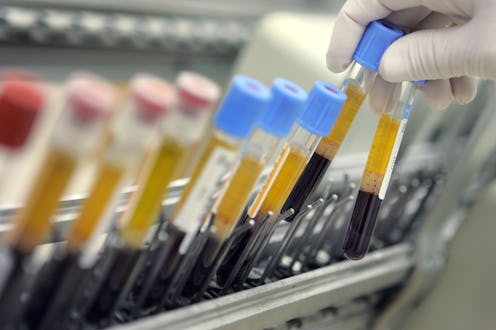News
A New Blood Test To Detect Cancer
Great news: Stanford researchers have developed a highly sensitive blood test that could detect and track cancer. The Stanford School of Medicine found that by scanning patients' blood for tumor DNA, they were able to determine whether patients have cancerous cells in their bodies. The medical community's inability to detect early-stage cancer has long been the bane of medicine, especially given the challenges associated with treating the disease in its later stages.
Dr. Maximillian Diehn is one of the co-senior authors of the new study, which was published in Nature Medicine. His lab focuses on understanding cancer stem cells — which are those that cause cancer to proliferate — and how to eliminate them in the quest to cure cancer. Lately, Dr. Diehn has devoted his studies to detecting DNA that originates from cancer tumors and finds its way into the patient's blood.
While it may seem as though detection of nearly indiscernible strands of DNA would be like finding a needle in a haystack, Dr. Diehn and his team have boosted current methods of extracting, processing and analyzing the DNA that allowed him to find "tiny amounts of DNA and scan large parts of it to look for mutations that come from tumors."
This new technology relies on being able to detect a cancerous "fingerprint" within patient DNA. Because cancer, at its most basic level, is a mutation of cell DNA, Dr. Diehn and his co-author Dr. Ash Alizadeh studied the genes that were most commonly altered by cancer, and looked for the mutations. While there are hundreds of mutations possible, their methodology only required one mutation to strike cancer-detection gold.
The importance of these cancer stem cells and their DNA has long been recognized, but this marks the first major breakthrough in detecting the tumors in the bloodstream. The test has, thus far, proven incredibly hopeful, with accurate identification of about half of patients with Stage 1 lung cancer, and all patients with the disease at Stage 2 or higher. This rate of success could mean wonders for both detection and treatment, and creates a new and considerably cheaper way of testing for cancer by way of a simple blood test.
Though the test is currently designed specifically for lung cancer, Dr. Diehn and Dr. Alizadeh hope to apply this technology to a variety of cancers. And they're not alone in their pursuits. The Scripps Research Institute in Florida has found a new marker for head and neck cancer that could help doctors and scientists determine the ideal long-term treatment for patients with these sorts of cancers.
Moreover, Dr. Luis Diaz of the Johns Hopkins School of Medicine has also successfully developed a blood DNA test that is applicable to 14 different types of tumors. This test had about a 50 percent success rate in detecting early-stage cancer in patients, which is still a remarkable number.
When breast cancer is detected at Stage 1, the five-year survival rate is 100 percent, according to the American Cancer Society. Even Stage 2 is relatively successful, with a 93 percent survival rate. However, Stage 4 patients only see a 22 percent chance of survival, a large drop from 72 percent at Stage 3. Cervical cancer runs similar statistics, with 93 percent survival at Stage 1, and only 15 percent survival by late Stage 4.
As such, being able to find cancerous cells at early stages is of paramount importance. Most Stage 1 patients exhibit next to no symptoms of illness, which generally makes detection a matter of pure luck. However, with the development of these sorts of tests, which are projected to only cost patients a few hundred dollars, cancer detection can enter a whole new era.
